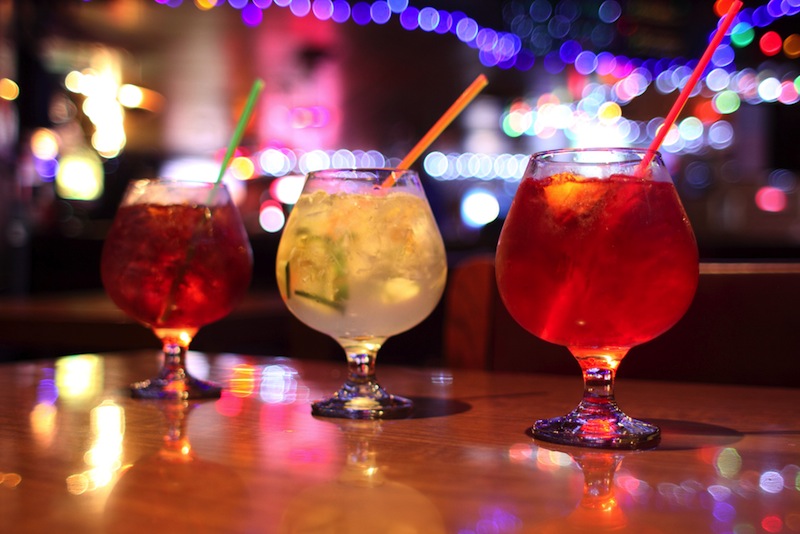What Is 'Hangover Free' Synthetic Alcohol, and Is It Safe?

A drink touted as a hangover-free synthetic alcohol, called "alcosynth," has people on the internet giddy about the prospect of alcohol-like effects without the headaches, dry mouth and nausea of a hangover.
British neuroscientist David Nutt, who invented alcosynth, said he developed it with the intention to save lives.
"Alcohol kills 4 million each year" worldwide, Nutt told Live Science in an email. "I want to stop the carnage!"
There were 8,697 alcohol-related deaths in the United Kingdom in 2014, according to the U.K.'s Office for National Statistics. In the U.S., nearly 88,000 people die of alcohol-related causes annually, according to the Centers for Disease Control and Prevention. The way that alcosynth is metabolized by the body could help people avoid some of the harmful, and potentially deadly, effects on the liver and heart normally associated with alcohol consumption, Nutt said in a statement released by the Adam Smith Institute (ASI), a U.K.-based libertarian think tank.
Nutt has offered little detail about what alcosynth actually is, how it works or how it might help people avoid the harmful effects of alcohol. On Twitter, he seems to imply that he's holding back these details until the intellectual-property rights are secure. According to The Independent, Nutt currently has 90 compounds of alcosynth in the works, including two that are being "rigorously tested for widespread use." [11 Interesting Facts About Hangovers]
Nutt estimates that alcosynth is 100 times safer than alcohol. One reason it's safer, he claims, is that a drinker would consume much less alcosynth than alcohol: A traditional drink usually contains a few grams of alcohol, but a person would consume only milligrams of alcosynth, Nutt said, adding that it's nearly calorie-free. It’s unclear whether someone could overdose or become dependent on alcosynth.
Nutt said another reason alcosynth may be safer to drink than alcohol is that when alcosynth is broken down in the body, the breakdown does not produce a compound called acetaldehyde, as alcohol does. Acetaldehyde is "a toxin that builds up in the body if we consume alcohol faster than we can fully metabolize it,” according to Scott Edwards, an assistant professor of physiology at the Louisiana State University Health Sciences Center's Alcohol and Drug Abuse Center of Excellence.
Get the world’s most fascinating discoveries delivered straight to your inbox.
If the amount of acetaldehyde in the body is higher than what the liver can process, this toxin can build up in the body, resulting in possible tissue damage, Edwards told Live Science. For people who drink heavily, this could lead to cirrhosis, a stage of alcohol-related liver disease where, if a person continues to drink, they have a 50 percent chance of dying in five years, according to the National Health Service. In heavy drinkers, acetaldehyde may also build up in heart tissue, causing damage that could lead to chronic heart disease.
What causes a hangover?
Hangover symptoms have been attributed to acetaldehyde, Edwards said. Although the ways different components of alcoholic drinks affect hangovers aren't quite clear, researchers have found that certain people who have a reduced ability to break down acetaldehyde may experience skin flushing and hangovers even after having only a small amount of alcohol, according to Johns Hopkins Medicine. This effect may have a genetic basis, and the gene may be more common in Asian people than in those of other races, research has shown.
In a similar way, the anti-drinking drug Antabuse blocks the enzyme that breaks down acetaldehyde. Therefore, drinking alcohol while taking the drug can result in vomiting and severe headache, according to Columbia University Medical Center.
However, the various unpleasant symptoms of hangovers may be related to the impact of both dehydration and acetaldehyde on hormones, blood chemistry, the sleep-wake cycle and inflammatory chemicals, according to Johns Hopkins Medicine.
Nutt claims that, in addition to helping people avoid hangovers and possible liver damage, alcosynth will have the "good effects" of alcohol, such as relaxed or slightly euphoric feelings.
Nutt has also said that the compounds in alcosynth, like those in alcohol, will mimic the neurotransmitter GABA, which can cause a reduction in anxiety. [7 Ways Alcohol Affects Your Health]
But Edwards said that "GABA is one of the most abundant neurotransmitters in your brain, so we have to be extra careful about messing with this system." An Increase in GABA activity can cause "significant impairment of judgment and motor function, with all the associated sociological and legal consequences," he said.
He added that alcohol impacts almost every organ, often in ways that cause damage if a person drinks excessively. This means that alcosynth would have to undergo extensive safety testing, particularly in light of its already existing reputation as a "drink all you want" substance.
Unclear health effects
Alcosynth is not currently available to consumers, but people should be careful about consuming synthetic alcohol if it becomes available before it is tested rigorously, Edwards said. He pointed to e-cigarettes as an example of a product that consumers can buy even though the health effects on the lungs and oral cavity are not fully understood. "One of the most dangerous aspects of any ingested substance — from fashionable street drugs to e-cigarettes — is not knowing exactly what chemicals are contained in the final formulation," he said.
Nutt is a renowned neuroscientist and is familiar with the many issues of establishing the safety of consumer products, Edwards said.
People are excited about alcosynth because it might be a way to let loose with fewer health-related consequences, but Edwards said there may be another, less obvious benefit.
"Hangover and other withdrawal symptoms are not simply a nuisance, but can contribute to lost work and school productivity, and thereby produce further socioeconomic consequences over time," Edwards said. Lost productivity due to weekend binging may still seem trivial, but for some people, it can lead to a vicious cycle in which they try to dull hangover symptoms with more drinking.
Original article on Live Science.



